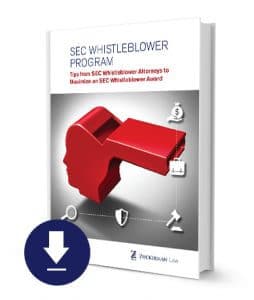Information “leads to” a successful SEC action if it causes the SEC to:
- Open an investigation (even if the information ultimately does not have a strong nexus to the SEC’s charges in the action);
- Re-open a previously closed investigation;
- Pursue a new line of inquiry; or
- If the information significantly contributes to an open investigation.
An individual may be eligible to receive an award where their information leads to a successful enforcement action—meaning generally that the original information either caused the staff to open an examination or investigation, or the original information significantly contributed to a successful enforcement action where the matter was already under examination or investigation.
In determining whether the whistleblower’s information “significantly contributed” to the success of the action, the Commission will consider whether the information was “meaningful” in that it “made a substantial and important contribution” to the success of the covered action. Order Determining Whistleblower Award Claims, Exchange Act Rel. No. 90922 (Jan. 14, 2021) at 4. For example, the Commission will consider a claimant’s information to have significantly contributed to the success of an enforcement action if it allowed the Commission to bring the action in significantly
less time or with significantly fewer resources, or to bring additional successful claims or successful claims against additional individuals or entities.
 Of the whistleblowers who received awards in FY 2021, approximately 56% provided original information that caused staff to open an investigation or examination, and approximately 44% received awards because their original information significantly contributed to an already existing investigation or examination. In assessing whether information assisted with an ongoing matter, the SEC considers factors such as whether the information allowed the SEC to bring an action in significantly less time or with significantly fewer resources, and whether it supported additional successful charges, or successful claims against additional individuals or entities.
Of the whistleblowers who received awards in FY 2021, approximately 56% provided original information that caused staff to open an investigation or examination, and approximately 44% received awards because their original information significantly contributed to an already existing investigation or examination. In assessing whether information assisted with an ongoing matter, the SEC considers factors such as whether the information allowed the SEC to bring an action in significantly less time or with significantly fewer resources, and whether it supported additional successful charges, or successful claims against additional individuals or entities.
A whistleblower whose only source of original information is an existing investigation or proceeding is unlikely to qualify for an award. Information that is exclusively derived from a governmental investigation is expressly excluded from the definition of “original information” under Section 21F(a)(3) of the Exchange Act.
Identifying important witnesses, who in turn provided helpful supporting evidence, be sufficient to demonstrate that a whistleblower significantly contributed to a covered action. See Order Determining Whistleblower Award Claims, Exchange Act Rel. No. 90864 (Jan. 7, 2021). But if the staff reached out to a witness identified by a whistleblower and the information provided by the witness was duplicative of information already known to the staff, the whistleblower will not receive an award for identifying the witness. See Release No. 97601 (May 26, 2023).
For more information about whistleblower rewards and bounties, contact the SEC whistleblower lawyers at Zuckerman Law at 202-262-8959. And click below to hear SEC whistleblower lawyer Matt Stock’s tips for SEC whistleblowers:






To learn more about the SEC Whistleblower Program, download Zuckerman Law’s eBook: SEC Whistleblower Program: Tips from SEC Whistleblower Attorneys to Maximize an SEC Whistleblower Award:
How the SEC Assesses Whether an SEC Whistleblower Tip Led to a Successful Enforcement Action
The May 2011 SEC release (Release No. 34-64545) adopting the rules governing the SEC Whistleblower Program states:
“As a general matter, in assessing whether information ‘led to’ a successful enforcement action, we will examine the relationship between the information in a submission and the allegations in the Commission’s complaint filed in the civil action or order filed in the administrative proceeding. Our inquiry will focus on whether the submission identifies persons, entities, places, times and/or conduct that correspond to those alleged by the Commission in the judicial or administrative action. As part of this analysis, we may consider whether, and the extent to which, the information included: (1) Allegations that formed the basis for any of the Commission’s claims in the judicial or administrative action; (2) provisions of the securities laws that the Commission alleged as having been violated in the judicial or administrative action; (3) culpable persons or entities (as well as offices, divisions, subsidiaries or other subparts of entities) that the Commission named as defendants, respondents or uncharged wrongdoers in the judicial or administrative action; or (4) investors or a defined group of investors that the Commission named as victims or injured parties in the judicial or administrative action.”
SEC Whistleblower Lawyers’ Tips for Qualifying for an SEC Whistleblower Award
SEC Whistleblower Bounties
whistleblower_lawyers_012017_infographic
Information leads to a successful SEC action if it causes the SEC to open an investigation, or if it causes the SEC to reopen a previously closed investigation. It can also lead to a successful enforcement action if it causes the SEC to pursue a new line of inquiry, or if it significantly contributes to an already open investigation.
Even where the SEC has already opened an investigation, a whistleblower can provide information that contributes to an enforcement action. A December 2022 order granting an award states: “[P]rior to Claimant’s provision of information, Enforcement staff had previously received a detailed referral from the Division of Examinations and had been investigating the conduct for more than a year before receiving Claimant’s tip. As such, much of the information Claimant provided was already known to the Enforcement staff, and the new, helpful information Claimant provided was fairly limited. On the other hand, Claimant met with Enforcement staff multiple times and remained cooperative throughout the investigation.” SEC Release No. 96474 (December 12, 2022).
The Commission will consider a claimant to have provided original information that led to the successful enforcement of a covered action if either: (i) the original information caused the staff to open an investigation “or to inquire concerning different conduct as part of a current . . . investigation” and the Commission brought a successful action based in whole or in part on conduct that was the subject of the original information;4 or (ii) the conduct was already under examination or investigation, and the original information “significantly contributed to the success of the action.” See Exchange Act Rule 21F-4(c)(2), 17 C.F.R § 240.21F-4(c)(2)
The “rules do not provide for awards based upon the potential or theoretical use of a claimant’s information. Instead, awards are based upon the actual use of a claimant’s information by Commission staff. As we have stated, “the standard for award eligibility is not what the staff would have, or could have done in hypothetical circumstances but, rather, what impact the whistleblower’s information actually had on the investigation.” Order Determining Whistleblower Award Claims, Exchange Act Rel. No. 92542 at 4 (Aug. 2, 2021) (quoting Order Determining Whistleblower Award Claims, Exchange Act Rel. No. 90872 (Jan. 7, 2021)) (internal quotation marks omitted). The Commission will not speculate on the supposed value of Claimant’s information in the absence of its actual use during the Investigation.” Release No. 95672 (Sept. 6, 2022).




